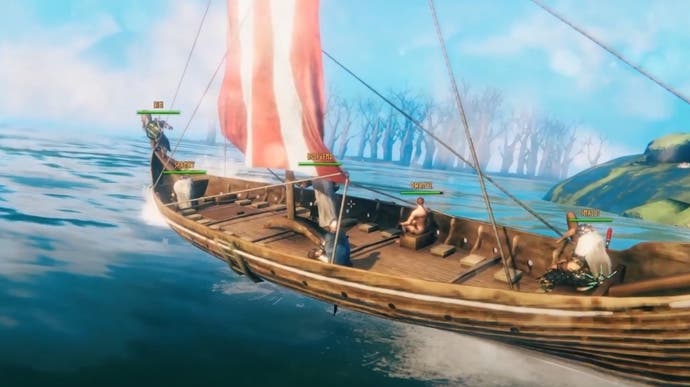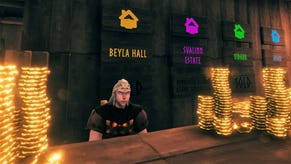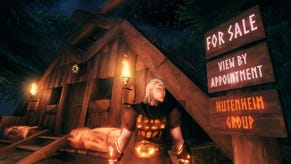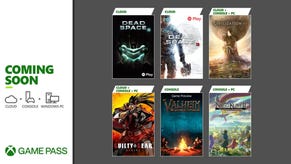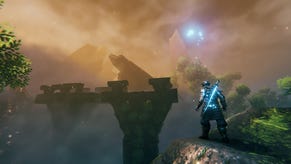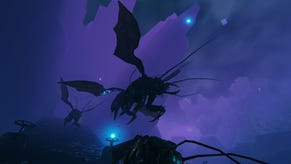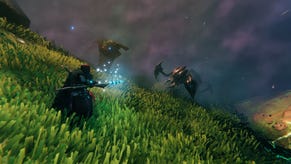I went on a ride-along with Valheim's Body Recovery Squad
What's SOS in Norse code?
A couple of weeks ago, I wrote an article about Valheim's Body Recovery Squad - a group of players who risk virtual life and limb to help players get their items back, no matter the difficulty, and do it all for free. It's a wonderful community effort, but something you might not expect is that the BRS is also a well-oiled machine, with lots of work going on in the background to keep the wheels turning. Members file paperwork, take part in training exercises, and even carry out industrial-scale farming to keep operators stocked and fed.
I discovered all this for myself when invited on a "ride-along" with BRS founding members Lucas (RimJaynor), Brendan (Spanky), Jonny (Small_T2) and Gareth (Rolivend), who took me on several missions and even gave me a tour of their warehouse. In total we went on four recoveries - some tougher than others - and on at least two occasions the team also had to recover me, too. I guess I could have done with a spear-proof vest. So here's an overview of what happened that evening, complete with footage from our dramatic first and fourth missions, and an MTV Cribs-style tour of the BRS warehouse.
To kick things off, you can find the video of our first mission below - featuring a very rough landing in the swamps. Discord and Steam overlays have been edited out to protect player information, so stick around a few minutes before we dive into gameplay:
So, what does a BRS recovery mission look like? If you're familiar with the BRS, you'll know that the community Discord serves as the centre of all their operations. Deathsquito victims can head into the assistance application channel to hit an SOS button, which opens a ticket and requests information from the user (such as which biome they died in). It then creates a private channel in which the client and recovery operators can chat. Clients can even share a screenshot of their game map to help operators plan a recovery route.
Once a ticket has been created, clients are brought into a Discord "waiting room" voice channel, and pulled into a voice chat with a group of operators. The operators then jump into the client's game (often through Steam friend requests), and get down to business. Operators come prepared with equipment to build a boat and plenty of potions and snacks to cater for both the operators and naked clients - "it's all about the experience," as Lucas explained - along with materials to place a backup BRS portal. This serves as an emergency route back to the group if an operator or client gets killed. And indeed, on several occasions I found myself taking the portal of shame - such as in our first mission recovering Dwayne's body in the swamp. Apparently the operators do sometimes have to recover each other, although Lucas assured me this wasn't a particularly frequent occurrence.
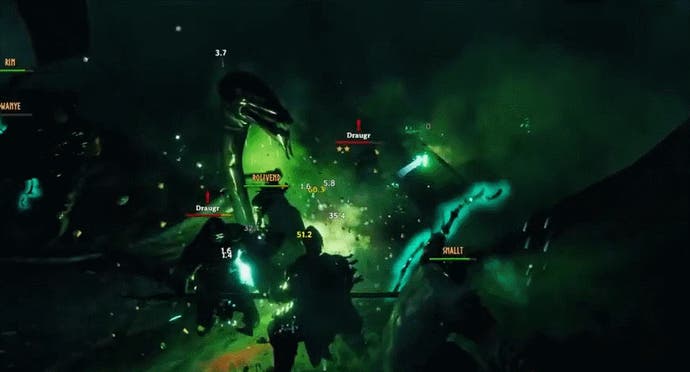
Beyond difficult enemies, it seems one of the greatest challenges Valheim can throw at operators is lag. Joining players on the opposite side of the world can be tricky, particularly when games are hosted on a client's PC, which sometimes results in some dodgy connections. On one of our recovery missions we had to spend a good 10 minutes figuring out how many could join without the server falling over, with operators backing out and rejoining to find the right balance. Eventually, we managed to proceed with a couple of operators, and the actual mission ended up being easier than the process of joining.
Once a mission is wrapped up, however, the work is not quite done: like any emergency service, there's paperwork to file. Operators fill out a short form with information such as the biome in which a recovery took place, and who went on the mission. The data is used to help track new operators as they go on their first missions: new recruits are currently required to go on five missions with experienced operators, before leading five missions themselves with the more experienced operators backing them up. But the paperwork also provides some interesting stats, such as which operator has carried out the most missions. The current record-holder is Shanz, who's carried out over 120 recoveries (and counting). At the time I went on the ride-along, the BRS had carried out a total of 651 recoveries - a number that's since increased to over 1000.
Interestingly, the data also gives us some insight into which biomes are the most dangerous, and it's fascinating to see some hard numbers. As you can see in the pie chart above, 18.5 per cent of BRS recoveries take place in the mountains, 29.6 per cent in the swamps, and a hefty 38.2 per cent in the plains, making it the most deadly biome. Although frankly, I could have told you that myself: our final mission of the evening saw the group descend an enormous mountain to take on deathsquitos and a massive fuling village, resulting in the death of one operator, and me - again. I have since invested in better armour.
Yet in-between the flurry of activity at the beginning and end of missions, there are often some surprisingly peaceful moments. Like true Vikings, on long boat rides BRS members use the time to hum tunes (ranging from funky numbers to "dark metal Viking music"), and share tales of particularly difficult battles. "There's one group that Billy did solo to recover six guys who were fighting Modor," Lucas told me when I asked about the group's biggest mass rescues. "He went in there and cleaned it all up and recovered all of them.
"There was another instance with myself, Shanz [and Trip]... this group had accidentally spawned a seven-man Bone Mass and couldn't kill it on their own. So the three of us went in there and fought it for them, and they didn't want any of the loot - they wanted to do it as legitimately as possible."
Along the way, the group also elaborated on the origins of the Body Recovery Squad. Rather sweetly, the four founding members all know each other from real life: Lucas and Brendan have known each other since the age of seven, while Jonny and Gareth were Lucas' first two friends in high school. Now in their early 30s with full-time jobs, the friends are divided by geography: Lucas moved to the west coast of Canada, while the others live on the east coast. Playing Valheim has been a way for the group to stay in touch, particularly given the extra limitations on travel thanks to the global pandemic.
The group got the idea for the BRS after accidentally stumbling into the plains, mistaking it for the meadows, and only narrowly escaping with their gear after an encounter with a deathsquito. The next day, a few of the group had the day off, and decided to help another player in trouble.
"Listen, I was sceptical of the whole thing," Jonny said. "Lucas one weekend said 'Jonny we should start the BRS' and I'm like yeah, okay. Later there's like 2000 people on the Discord..."
And indeed, the BRS has since evolved into a much larger operation, with operators from all over the world (including the UK, Germany, Singapore and Australia). But at the start the friends really didn't have much in terms of gear: they were "barely touching iron", and nowhere near endgame gear, with Lucas describing the operation as "faking it to make it".
"Jonny and I used to run around in iron gear, rescuing guys in padded gear, and they'd say 'wow you guys... is that all the gear you brought?' And I would say 'ah that's not all our best stuff'. Lo and behold, that was our only boat, our only sets of armour... everything."
Nowadays, of course, the group has far better equipment - and there's a huge behind-the-scenes operation to keep members stocked for missions. Some BRS members choose to spend much of their time as "quartermasters", gathering and sorting resources to help with recovery efforts, while others maintain massive crop fields to provide the team with food (including a 3700-plot barley farm).
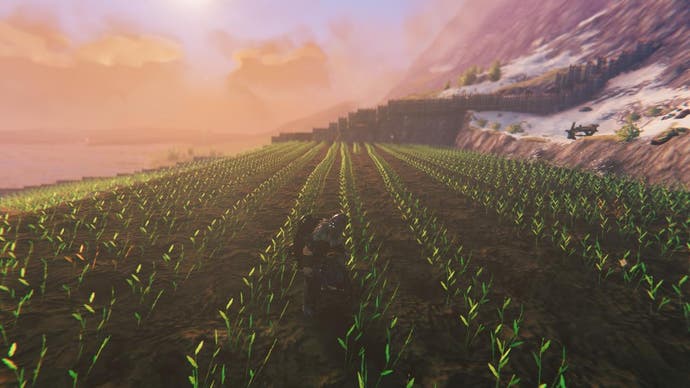
The BRS also has its own warehouse, effectively a centre of operations, in which operators can access resources, workbenches and their own lockers. The warehouse even has an items chute, in which operators can dump their unwanted items for sorting in the basement below. But if a ticket comes in, that recovery mission takes priority, and operators will down tools to go help a Viking in need. For an extended tour of the warehouse, make sure to check out the full video (after I was eventually able to enter following some lag problems):
So, what next for the BRS? The group currently seems pretty busy on-boarding new operators, and keeping up with the large number of clients seeking assistance. But it also has plans to expand its social media presence, with the possibility of BRS Twitch streams on the horizon. In building terms, the group is also working on a central hangout space, which will take the form of a giant castle and provide a place for operators to relax in-between missions.
As the organisation now appears to have taken on a life of its own, I was curious to hear how long the founding members plan on running the organisation - particularly given the BRS is now at a scale where running recovery missions could almost be a "full time job".
"I think it's mainly going to be dictated by the longevity of the game," Lucas explained. "Right now Valheim is the hottest topic in the gaming world, and I don't see that going away anytime soon. They've done something really cool here that taps into something very modern, but also somewhat old school at the same time.
"I think as this gets more updates, then there'll be a big influx of players again... then we'll have to master the harder biomes so we can actually do [them] ourselves."

So it sounds like the founding members are going to continue for the foreseeable future, and I have to say, after spending an evening with them I'm tempted to become an operator myself. There's a fantastic sense of camaraderie amongst the group, and you never quite know what you're going to get on each recovery: it could be the simplest clean-up job, or a massive battle requiring excellent communication and teamwork. For high-level players waiting for future updates, I imagine it's also a great way to generate extra challenge once you've mastered the game. But more importantly, it's just a lovely way to help newer players - and we can always do with more of that in the world.
